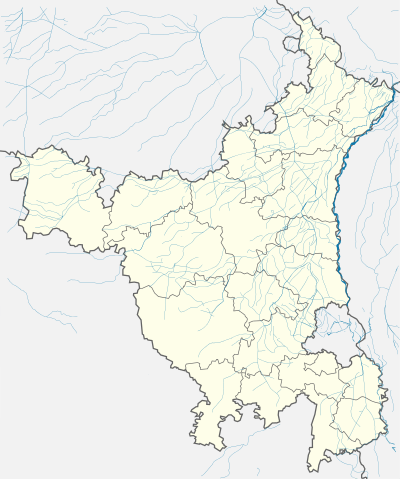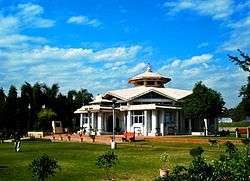Panchkula
| Panchkula पंचकुला ਪੰਚਕੂਲਾ | |
|---|---|
| City | |
|
Yagya Shala, within the Mansa Devi temple complex | |
| Nickname(s): Chandigarh Tricity | |
 Panchkula  Panchkula Location in Haryana, India | |
| Coordinates: 30°44′N 76°48′E / 30.74°N 76.80°ECoordinates: 30°44′N 76°48′E / 30.74°N 76.80°E | |
| Country |
|
| State | Haryana |
| District | Panchkula |
| Government | |
| • Type | Municipality |
| • Body | Municipal Corporation Panchkula |
| • Mayor | Upinder Kaur Walia[1][2] (INC) |
| Area | |
| • Total | 816 km2 (315 sq mi) |
| Elevation | 365 m (1,198 ft) |
| Languages | |
| • Official | Hindi, Punjabi, English |
| Time zone | IST (UTC+5:30) |
| PIN | 134 109 - 134 114 |
| Telephone code | +91-172-XXXXXXX |
| ISO 3166 code | IN-HR |
| Vehicle registration | HR-03 |
| Website |
panchkula |
Panchkula (Hindi: पंचकूला) is a planned city in the Panchkula district, Haryana, India. It forms a part of a continuous area with the Union Territory of Chandigarh and the city of Mohali. It is approximately 4 km (2.4 miles) southeast of Chandigarh and 259 km (162 miles) northeast of New Delhi, the national capital. The Chandigarh-Mohali-Panchkula metropolitan region collectively forms a Tri-city, with a combined population of over 2 million.
The city hosts the Chandimandir Cantonment, the headquarters of the Western Command of the Indian Army. In 2011, Panchkula had population of 561,293 of which male and female were 299,679 and 261,614 respectively.
Etymology
The word Panchkula is derived from the local word panch (Sanskrit: पंच) (five) and kula (Sanskrit: कुला) (canals)"The city of 5 canals", possibly referring to five irrigation canals that distribute water from the Ghaggar-Hakra River.[3]
Geography and climate
Panchkula district has a sub tropical continental monsoon climate having, hot summers, cool winters, good monsoon rainfall. It has great variation in temperature (-1 °C to 43 °C). Sometimes winter frost occurs during December and January. The district also receives winter rains from the western disturbance. The rainfall is mostly received in the monsoon. Morni hills constitute the highest point of the district as well as of Haryana. The Ghaggar is the only perennial river, which is very shallow outside of the monsoons.
Generally the slope of the district is from north east to south west and in this direction, most of the rivers/streams rain-fed torrents flow down and spread much gravel and pebbles in their beds. Only the Sirsa river, in Kalka Tehsil, flows towards north-west. The soils in the district are mainly light loam.
The underground water in the district is generally fresh and suitable for domestic and irrigation purposes. The underground water level is generally high in the southern parts and low in north and north-east which is hilly tract. The district lies in the Himalayas boundary fault zones and earthquakes of moderate to high intensity have occurred in the past.

Average temperature
- Spring: The climate remains the most enjoyable part of the year during the spring season (from February-end to early-April). Temperatures vary between (max) 13 °C to 20 °C and (min) 5 °C to 12 °C.
- Autumn: In autumn (from September-end to mid November.), the temperature may rise to a maximum of 30 °C. Temperatures usually remain between 10° to 22° in autumn. The minimum temperature is around 6 °C.
- Summer: The temperature in summer (from Mid-April to June-end) may rise even above 40 °C. Temperatures generally remain between 30 °C to 39 °C (94 – 101F).
- Monsoon: During monsoon (from early-July to mid-September), Panchkula receives moderate to heavy rainfall and sometimes heavy to very heavy rainfall (generally during the month of August or September). Usually, the rain bearing monsoon winds blow from south-west/south-east. Mostly, the city receives heavy rain from south (which is mainly a persistent rain) but it generally receives most of its rain during monsoon either from North-west or North-east. Maximum amount of rain received by the city of Panchkula during monsoon season is 195.5 mm in a single day.
- Winter: Winters (November-end to February-end) are mild but it can sometimes get quite chilly in Panchkula. Average temperatures in the winter remain at (max) 5 °C to 14 °C and (min) -1 °C to 5 °C. Rain usually comes from the west during winters and it is usually a persistent rain for 2–3 days with sometimes hail-storms.[4]
Administration
Panchkula has branch offices for a number of state government agencies including:
- Haryana Urban Development Authority
- Central Board of Secondary Education
- Department of Technical Education
- Staff Selection Commission
- Regional Transport Authority
- District Education Office
- Public Service Commission
- Regional Employment Office
- Food and Supply Controller
- Education Department Headquarters, Shiksha Sadan
- Utkarsh Society, DIET Campus, Edusat Building, Sector-2, Panchkula
Notable People from Panchkula
- Sardar Anjum, Indian Poet and Philosopher, Padma Bhushan and Padam Shri.
Tourism
Morni Hills
An offshoot of Shivalik range, Morni hills near Chandigarh are located at a distance of about 45 km from the city of gardens. It is a beautiful hill resort that has a real scenic beauty. Morni hills have been named after Queen Morni, who is said to rule this city.
Pinjore Gardens
Also known as Yadavindra Gardens, the Pinjore Gardens are situated about 20 km (12 mi) from the city, and cover a total area of 100 hectares (250 acres). The work of creating the gardens began in the seventeenth century. Pinjore Gardens is the venue for an annual mango festival. The garden houses a mini zoo, historic places, Japanese garden, nursery and a number of picnic spots. According to Hindu theology, the Pandava brothers rested in Pinjore during their exile.
Cactus Garden & Yavnika Garden
The 7 acres (2.8 ha) cactus garden in the centre of Panchkula was established in 1987, and is known for its rare and endangered species of Indian succulents.
Mansa Devi temple
The temple is one of the most prominent temples in North India and is dedicated to Goddess Mansa Devi, a form of Shakti.
Demographics
See also
References
- ↑ Saini, Manveer (5 July 2013). "Upinder Walia is 1st mayor of Panchkula MC". The Times of India. Retrieved 13 October 2015.
- ↑ "Ahluwalia is Panchkula's first woman Mayor". Indian Express. Retrieved 13 October 2015.
- ↑ Haryana Review 2013, page 30
- ↑ "World Weather Information Service - Chandigarh". wmo.int.
- ↑ http://www.census2011.co.in/census/city/29-panchkula.html
External links
| Wikimedia Commons has media related to Panchkula. |
